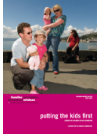This Families Commission report shows how some couples have set aside their personal and relationship issues and put their kids first.
This report is the first study to ask New Zealand parents how they made decisions about caring for children post-separation. The report provides examples of the types of care arrangements separated parents put in place – from shared care or weekend stays, through to occasional or infrequent contact. Parents settle on arrangements that work for their particular circumstances and they told us good communication is vital. Parents also have varying needs for information and support services. Some benefit from the support of family and friends, others rely on professional services like counselling. The study demonstrates that many parents have an excellent and intuitive understanding of what is in the best interests of their children.
Purpose
The aim of this study was to interview a sample of parents in order to generate information on:
- the pathways through which these parents make decisions regarding postseparation parenting arrangements for their children
- the arrangements that these separated parents come to regarding the frequency, amount and type of contact they have with their children
- how well these arrangements work for these parents, and how and why the arrangements may have changed over time.
Methodology
This study interviewed 39 separated parents (24 mothers, 15 fathers), including eight separated couples, to find out how they made these decisions. These parents volunteered to participate in response to newspaper articles about the study. Six were Māori, and six were Pacific people. In addition, representatives of the Family Court and five organisations that provide services and information for separating parents were consulted: Relationship Services, Citizens Advice Bureau, Skylight, Taeaomanino Trust and Birthright.
Interviews were transcribed and analysed thematically. The sample was not representative of separated couples in New Zealand, as they were self-selected and were likely to be those who were articulate, had strong opinions and were satisfied with their own experiences. In particular, we asked for the involvement of parents who had made their own arrangements, and this probably resulted in the relatively high rate of shared care in our sample. Highly conflicted parents and parents who have little or no contact with their children are not represented in the sample. Consequently, the findings of this study cannot be generalised to the total population of separated parents.
Key Results
Key insights emerging from the interviews, combined with findings from the literature, are:
- Parents are able to negotiate arrangements between themselves, given the right context and support.
- The ability to set aside partnership and individual issues, and to give priority to children’s wellbeing, is central to negotiating successful outcomes.
- Respectful and businesslike communication is an important part of negotiating successful living arrangements.
- Parents ‘experiment’ with different arrangements rather than putting themselves under pressure to ‘get it right’ the first time.
- Flexibility and reciprocity in regard to arrangements appears to be beneficial, if parents can establish a co-operative co-parenting relationship that enables this.
- Families settle on arrangements that work well for their specific circumstances – no one care arrangement will work successfully for all families.
Further research on post-separation care arrangements is needed that involves more representative groups of separated parents, including parents who have little or no contact with their children, highly conflicted parents, Maori and Pacific families and new migrant groups. Quantitative data would provide fuller information about the range of care arrangements that are experienced by separated families in New Zealand.

